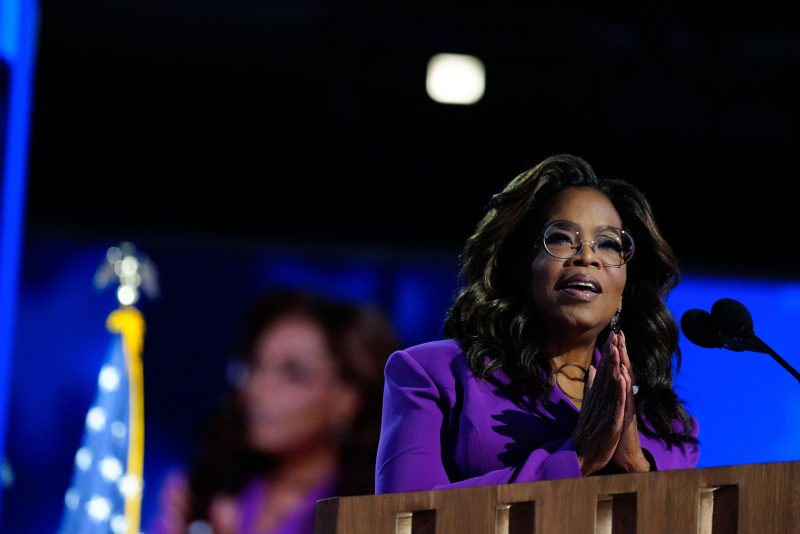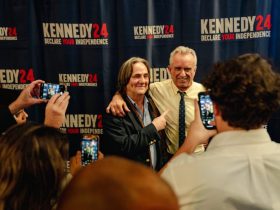CHICAGO — When a mysterious 15-minute gap appeared in the Democratic National Convention’s Wednesday night programming, a rumor — quickly confirmed — began circulating that the surprise speaker would be none other than Oprah Winfrey.
And when the mononymous daughter of Chicago, her chosen hometown, took the stage in the United Center here — beaming off the Jumbotron in her vivid lilac pantsuit — she was greeted with an immediate roar and standing ovation.
“Who says you can’t go home again?” the talk-show queen broadcast from the house of the Bulls.
In ways both literal and figurative, Winfrey’s Wednesday night speech was indeed a homecoming in which she fulsomely returned to the political arena 16 years after her debut political endorsement of Barack Obama to once again bestow the full force of her celebrity and cultural power, this time on Vice President Kamala Harris.
Describing herself as a political independent who always votes her values, Winfrey offered a largely apolitical speech, instead serving as yet another voice at the United Center calling for joy and decency, and emphasizing “common sense over nonsense.” (Even her head-to-toe choice of color — purple — offered the simultaneous promise of bipartisanship and nonpartisanship).
“So I’m calling on all you independents and all you undecideds,” Winfrey said, imploring would-be voters far outside the convention perimeter to support Harris. “You know I’m telling you the truth that values and character matter, most of all, in leadership and in life, and more than anything — you know, this is true — that decency and respect are on the ballot in 2024.”
“Common sense tells you that Kamala Harris and Tim Walz can give us decency and respect,” she continued.
Winfrey, who over her career has been dubbed the most influential and powerful woman in the world by everyone from CNN to Forbes to Time, has long embodied the so-called “Oprah effect” — the ability to influence public opinion, say, or send book sales skyrocketing with almost a single utterance.
But her first foray into electoral politics did not come until 2007, when she pointedly chose her fellow Chicagoan over Hillary Clinton in the Democratic primary for president.
Calling him “the one,” Winfrey hosted fundraisers for and appeared at rallies with Obama in early primary states, emerging as one of his most potent and important supporters. Moments after Obama accepted the Democratic nomination in 2008 at Denver’s Invesco Field, Winfrey described his speech as “the most powerful thing I have ever experienced.”
“I cried my eyelashes off,” she said at the time.
Since then, Winfrey has continued to periodically weigh in on certain races — she supported Clinton in 2016, for instance. But no subsequent endorsement has quite matched the shimmering synergy of the merging of Obama and Winfrey, two charismatic Black leaders marshaling complementary cultural movements.
Yet Wednesday night offered something of a symbolic and almost physical torch-passing, with Winfrey — American royalty and Chicago uber-royalty — serving as the bridge between the Obamas, who both spoke Tuesday evening, and Harris, who will officially accept her party’s nomination Thursday night at the United Center.
There were signs that Winfrey viewed Harris’s historic ascent as similar to that of Obama, including when she told People magazine just days after Joe Biden and Harris were officially declared the winners of the 2020 presidential race that she wished Black poet, writer and activist Maya Angelou had been alive to see it.
“I think what she means for women of the world is so extraordinary,” Winfrey told the magazine at the time. “For women here in the United States, we can’t even measure it. Because to see someone who looks like you in this role, you see what’s possible for yourself.”
Popping back into the political fray Wednesday in support of Harris, Winfrey served as yet another strong Black woman who delivered yet another powerful speech.
“And let us choose the sweet promise of tomorrow over the bitter return to yesterday,” she said, before turning to what has emerged as a signature line of Harris’s: “We won’t go back. We won’t be set back, pushed back, bullied back, kicked back. We’re not going back.”
Winfrey never uttered the names of the men atop the Republican ticket — former president Donald Trump and Sen. JD Vance of Ohio — and even her pointed digs were loosely couched in the idea of appealing to the nation’s common decency.
She described at times being on “the receiving end” of “racism and sexism and income inequality and division,” before saying, “but more often than not, what I’ve witnessed and experienced are human beings, both conservative and liberal, who may not agree with each other, but who still help you in a heartbeat if you are in trouble.”
She continued: “When a house is on fire, we don’t ask about the homeowner’s race or religion. We don’t wonder who their partner is or how they voted. No. We just try to do the best we can to save them.”
Then, pausing, Winfrey finished the riff by alluding to comments Vance made in 2021 on Fox News about “a bunch of childless cat ladies” who are miserable in their lives.
“And if the place happens to belong to a childless cat lady, well, we try to get that cat out, too,” she concluded, as the crowd cheered.
Winfrey’s prime-time performance was the sort of speech — not unlike her remarks at the 2018 Golden Globes, when she received the Cecil B. DeMille award for lifetime achievement — that seem likely to prompt a swirl of speculation about her own political ambitions.
But as if to clear up any doubt, Winfrey ended her remarks by calling on the crowd to choose honor and joy. Then, throwing her arms open wide, she sang Harris’s name in a throaty vibrato: “And together, let’s all choose Kamala HAR-RIS!”








